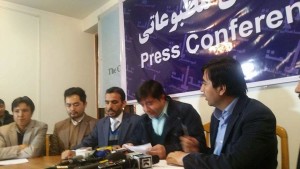On Continuing the ICC’s Investigation into Potential War Crimes in Afghanistan
15 Dec 2015 – Kabul, Afghanistan
No to Silence on War Crimes!
After the fall of the Taliban and the establishment of the current government, it was expected that there would be no more war crimes and, with the start of the transitional justice process, the culture of impunity for atrocities would also end. This expectation was strengthened particularly after Afghanistan became a member of the International Criminal Court (ICC) in 2003. However, since then, war crimes continued to be committed and transitional justice was neglected under the pretense of maintaining peace. Consequently, this period has not only failed to establish peace but has also resulted in more war and atrocities in Afghanistan. Potential war crimes by the various sides to the conflict have once again reached a peak in 2015, as evidenced by civilian protection reports by the UN and other human rights organizations. The latest instances of potential war crimes in Kandahar, Zabul, Wardak, Kunduz and Jalalabad are but a few of the cases that seriously necessitate investigation by international organizations, particularly the ICC.
The Transitional Justice Coordination Group (TJCG) has repeatedly called for an end to the culture of impunity for atrocities in Afghanistan and now, considering the intensification of the conflict and the increase in potential war crimes, we make the following demands from the Afghan government, the ICC and Afghanistan’s partner nations:
To the Afghan government:
• The Afghan government should put an end to the culture of impunity for war crimes by resurrecting the moribund efforts for transitional justice;
• The Ministry of Foreign Affairs should extend all necessary cooperation to the ICC and pave the way for the Court to continue its investigations in Afghanistan.
To the ICC:
• The ICC should continue its investigations into potential war crimes in Afghanistan and prosecute those implicated in war crimes and other atrocities;
• The Transitional Justice Coordination Group is committed to cooperating with the ICC, and we ask the Court to appropriately coordinate its activities in Afghanistan with Afghan civil society groups and the TJCG.
To the United Nations and Afghanistan’s partner nations, including NATO member states:
• We ask the UN and Afghanistan’s partner nations to support justice and accountability in any potential peace talks and not allow justice to be sacrificed for a peace deal with the Taliban;
• Reconciliation without justice is not durable; therefore, we ask the United Nations and NATO member states to pave the way for the ICC to work in Afghanistan and to urge the Afghan government and its partner states to do their part in this regard.
Transitional Justice Coordination Group Statement
Tuesday 15 December 2015
Categories: Afghanistan, Events, Expert Narratives, International Criminal Court - ICC, International Justice, Issues, Transitional Justice and Peace, War and Peace
Get last update from feed: Main Feed
Get last comment updates: RSS 2.0

